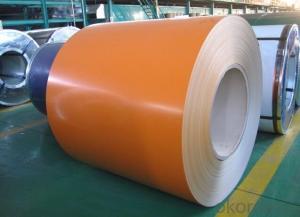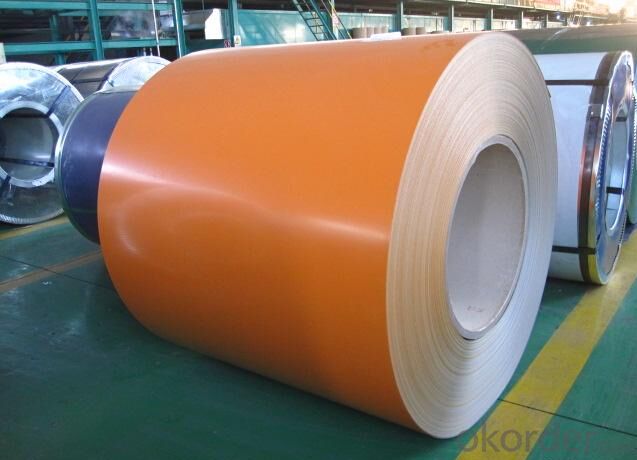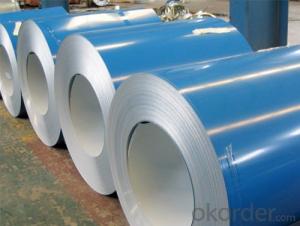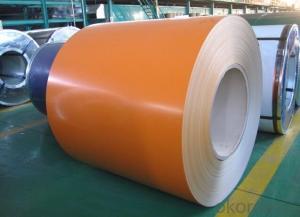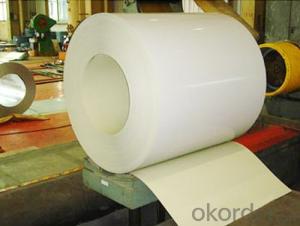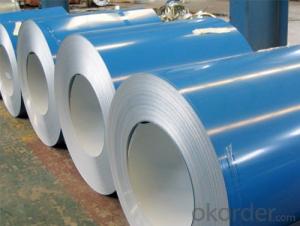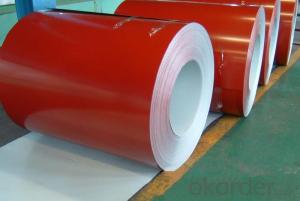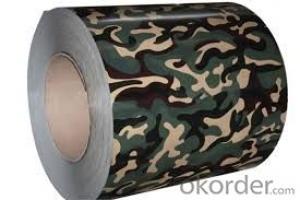Pre-painted Galvanized Sheet Coil with Good Quality and Lowest Price
- Loading Port:
- Shanghai
- Payment Terms:
- TT OR LC
- Min Order Qty:
- 100 m.t.
- Supply Capability:
- 10000 m.t./month
OKorder Service Pledge
OKorder Financial Service
You Might Also Like
1.Structure of Pre-painted Galvanized/Aluzinc Steel Coil Description
finally the plate steel is called pre-painted galvanized (aluzinc) steel. Pre-painted galvanized steel is good capable of decoration, molding, corrosion resistance. 2.Main Features of the Pre-painted Galvanized/Aluzinc Steel Coil
• Excellent corrosion resistance
• Excellent weather resistance
• Capability of decoration, molding, corrosion resistance
• Excellent heat resistance performance
• High strength
3.Pre-painted Galvanized/Aluzinc Steel Coil Images
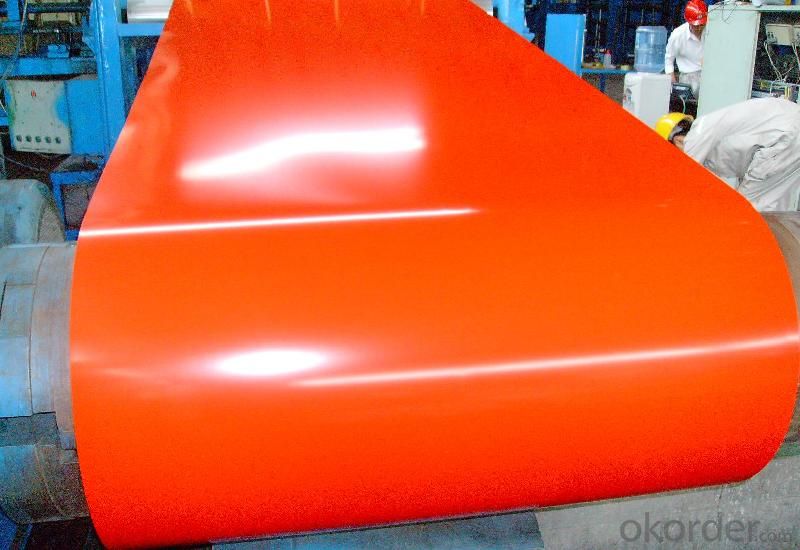
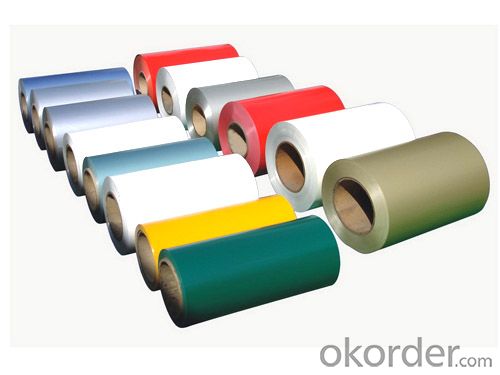
4.Pre-painted Galvanized/Aluzinc Steel Coil Specification
Quality standar: JIS G3312 CGCC & CGLCC
Hardness of P: Both soft and hard quality are available
Surface finish: with or without protect film
Thickness : 0.14-1.20 mm
Width : 914mm, 1000mm, 1220mm and 1250mm, thickness 600-1250mm is available
Max loading weight in one 20ft container : 25 tons generally
Finish by coil or sheet: Both sheet and coil are available
8Zinc coating: 60-275G/M2, both sides
Paint thickness for top side : 5 micron primer + (10-20) microns modified polyester, any RAL color code.
Paint thickness for back side: (5-10) microns Epoxy
Weight per coil: 4-6 tons, also can be upon customer's requirements
5. FAQ of Pre-painted Galvanized/Aluzinc Steel Coil
We have organized several common questions for our clients,
We have established the international advanced quality management system,every link from raw material to final product we have strict quality test;
- Q: What are the advantages of using steel coils in construction?
- Using steel coils in construction offers several advantages. Firstly, they possess immense strength and durability, enabling them to withstand heavy loads and resist deformation. As a result, they are perfect for structural purposes such as beams, columns, and frames. Secondly, steel coils exhibit exceptional versatility. They can be easily shaped and molded into various forms, providing flexibility in design and construction. Steel coils can be rolled, bent, cut, and welded according to specific project requirements. This adaptability makes them suitable for a wide range of construction applications. Another benefit of utilizing steel coils in construction is their resistance to corrosion. To prevent rusting and corrosion, steel coils are often coated with protective substances like galvanized or stainless steel. This ensures that the building's structural integrity remains intact over time, even in harsh environmental conditions. Furthermore, steel coils offer excellent fire resistance. Unlike materials such as wood, steel does not burn or contribute to the spread of fire. Hence, it is a safer option for construction, especially in high-rise buildings or areas prone to fire hazards. Lastly, steel coils are cost-effective. Although the initial cost of using steel coils may be higher compared to other materials, their longevity and low maintenance requirements make them a cost-efficient choice in the long run. Steel coils have a long lifespan and necessitate minimal repairs or replacements, resulting in reduced maintenance costs and increased overall value. In conclusion, the advantages of using steel coils in construction encompass their strength, versatility, corrosion resistance, fire resistance, and cost-effectiveness. These qualities make steel coils an outstanding choice for various construction applications, contributing to the durability and safety of buildings.
- Q: Can steel coils be transported by air?
- Yes, steel coils can be transported by air. Air freight companies have the capability to transport heavy and oversized cargo, including steel coils, using specialized aircraft and equipment. However, due to their weight and size, transporting steel coils by air can be more expensive compared to other modes of transportation such as sea or rail.
- Q: What are the dimensions of steel coils used in the structural component industry?
- The dimensions of steel coils utilized in the structural component sector are subject to variation, contingent upon the particular application and specifications. Nevertheless, standard dimensions for steel coils in this industry encompass a width that ranges between 600mm and 2000mm, as well as a thickness that spans from 0.25mm to 10mm. The weight of these coils may also differ, typically ranging from a few kilograms to numerous tonnes. Furthermore, the length of the steel coils can be customized to fulfill the specific demands of the structural component industry, with commonplace lengths including 2000mm, 2500mm, and 3000mm. It is vital to acknowledge that these dimensions are not exhaustive and are susceptible to variation based on the specific product and manufacturer.
- Q: How are steel coils used in the production of bridges?
- Steel coils are used in the production of bridges as they are processed and shaped into various structural components like beams, plates, and girders. These coils are first uncoiled and then cut, rolled, and welded to create the required bridge sections. The high strength and durability of steel make it an ideal material for bridges, and the use of steel coils allows for efficient and precise manufacturing of these vital infrastructure elements.
- Q: How are steel coils used in the production of shipbuilding components?
- Steel coils are used in the production of shipbuilding components as they are the primary raw material for manufacturing various structural and mechanical parts, such as hulls, decks, bulkheads, and frames. These coils are unwound, cut, shaped, and welded to form the required sections and profiles, providing the necessary strength and durability to withstand the harsh marine environment.
- Q: Is Stainless steel called that because.....a. Its stains lessORb. Its virtually stainless (it can't stain).Lol do you know the correct answer?????
- a. is the correct answer. It will still show tea and coffee stains. I find using baking soda is a good way to clean it and freshens the drains of the sinks as well. If cleaning your refrigerator a glass cleaning spray works well, just be sure to dry it thoroughly.
- Q: should I shoot Herters .308 steel cased ammo in my Remington 7400.and why shouldn't I?
- Should you?...... Its a free country - You can do what you want....... Why shouldn't you?...... If I got it right - That Herters ammo is foreign made steel case ammo..... Most of that stuff has a reputation for being dirty and likes to foul semi-auto rifles up..... I suppose if you use a little of that stuff now and then it would be ok........ Usually that steel cased stuff is used by folks that own military style semi-0auto guns and bolt action rifles...... Those types of guns for the most part are well suited to use that cheap steel case...... A Remington 7400?..... This is just my opinion - but that's a hunting rifle and isn't up to the rigors of blasting a few hundred rounds of ammo off in an afternoon....... Get a different gun for that...... Occasional use?... Yeah its alright...... If this is for hunting use a better grade of brass cased ammo.......
- Q: Heard some steel companies like TATA Steel and JSW are in good performance. can some one suggest me if its good time to invest in steel industry ?
- I feel metal stocks can give some return now if you invest.
- Q: How are steel coils protected from humidity?
- Steel coils are typically protected from humidity through a process called galvanization, where a layer of zinc is applied to the surface of the steel. This zinc coating acts as a barrier, preventing moisture from coming into contact with the steel and causing corrosion. Additionally, the coils may be stored in a controlled environment with low humidity levels to further protect them.
- Q: How are steel coils inspected for width variations?
- Steel coils are inspected for width variations using specialized equipment such as laser or optical sensors that measure the width of the coils at regular intervals. These sensors provide accurate and precise measurements, allowing inspectors to identify any variations in width across the length of the coil.
Send your message to us
Pre-painted Galvanized Sheet Coil with Good Quality and Lowest Price
- Loading Port:
- Shanghai
- Payment Terms:
- TT OR LC
- Min Order Qty:
- 100 m.t.
- Supply Capability:
- 10000 m.t./month
OKorder Service Pledge
OKorder Financial Service
Similar products
Hot products
Hot Searches
Related keywords
